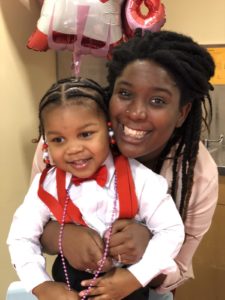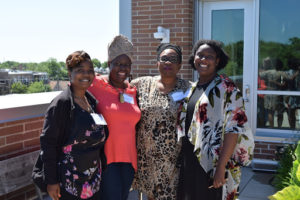A Day-in-the-Life of a New Moms Family Support Coach

You may know that building strong families is central to New Moms’ mission, but have you ever wondered how exactly we work with moms to increase their family’s immediate well-being and construct foundations for a thriving future?
Back in March, we asked former Family Support Specialist, Tracey Bell-Hodgman, to describe a day-in-the-life of a coach at New Moms, and to share what she wishes you knew about the families we partner with.

Tracey said New Moms’ partnership with young families requires our staff to be flexible, adaptable, and empathetic.
“My day starts with an 85% full and detailed calendar that 100% of the time does not go according to plan. I typically try to check in with the young women I have scheduled in-home coaching visits with to make sure they are still available. During a home visit, a participant and I get together to discuss their goals as well as any barriers they may be facing at the moment. It is where much of the relationship-building gets done.”
At New Moms, Family Support Specialists, also called coaches, partner with young moms as they set and pursue their own unique goals. Coaches share parenting tips, child development resources, and other life skills tools that are specific to participants’ needs. We call this our Family-Centered Coaching Approach, which puts families experiencing poverty in control of their goals and helps unleash their potential as leaders and self-advocates.
“One thing I wish people outside of New Moms knew is that the moms, my participants, get to call their own shots. The moms I serve are savvy and smart in so many ways. Many of them know what they want from their lives and they just need support in getting it. They are in the driver’s seat of their lives and it is my honor to be their copilot.”
Achieving these goals is often difficult. Systemic racism perpetrated against Black and Brown people, bias against adolescent moms, and lack of investment in communities of color harms young families. Living in poverty and experiencing scarcity can impact brain development and take a toll on long-term individual and community health. Although 97% of the young families that come to New Moms are experiencing poverty, all of them seek a future of shared prosperity with their children.
“These moms have a lot going on, they need patience and flexibility—and sometimes I need that, too. You are holding some of the most difficult emotions with people. It is difficult to describe. I am haunted by the questions of where a woman with two young children is going to call home when she moves out.”
Our coaches help moms navigate stressful situations around housing, employment, and family well-being. When moms are coping with scarcity and become overwhelmed, our coaches are there to offer individualized support.
“At New Moms, we work hard to provide participants with the space to process on their own so that they can grow to be the powerful young women we know they are. Oftentimes, women come to us to discuss issues they aren’t sure who else to turn to about. We walk alongside them as they figure out the answer to their questions, learn to fill out forms, or advocate for their families in ways they weren’t sure they could.”
Though our moms experience many difficulties, they also experience many triumphs. Our coaches work with them to tap into their resilience to get through those challenges and bear witness to moments of celebration.

Tracey said she also wants people to know that moms in our programs are growing. Every day, she said she sees them take in information and learn new ways to handle challenges. “What’s also exciting is that while the moms are growing, their children grow alongside them.” Tracey stressed it’s important that people understand that “…moms need advocacy. They not only need allies but also to be taught how to use their own voices.”
“I sat with a mom in her apartment who was having trouble with her TANF (Temporary Assistance for Needy Families). Her son scrambled around our feet, picking up each toy and showing it to us. The mom poured out her frustration over the situation while her son played. When she first moved into our transitional housing this bad news would have crushed her. However, today, after letting her frustration out, she then picked up her son and sang the ABCs with him, pride absolutely beaming from her face. She turned to me, and said ‘Ok, so what do we do next.’ We made a battle plan. She was going to take the lead and advocate for herself at the Department of Human Services. This mom took a frustrating situation in stride. She nurtured her child, and then got back to business.”
This is an excellent example of the challenges participants face every day and must find a way to manage. Our moms continually push through systemic barriers and take powerful first steps towards their long-term goals. This process takes a lot of time and patience. Our coaches are often planting seeds of change that they will not get to see come to fruition.
“As a Family Support Specialist, what I want you to know about my job is that I’m not here to fix anyone. Coaches are here to provide the support necessary for the moms to grow. The moms we serve at New Moms have strength many of us can’t begin to imagine. They are not damsels in distress but rather heroines who have not discovered their own power yet.”
Thank you to all of New Moms’ amazing coaches. We’re in awe of both you and your participants. The work you do is challenging, but the compassion and dedication you give to the young families you work with is inspiring.